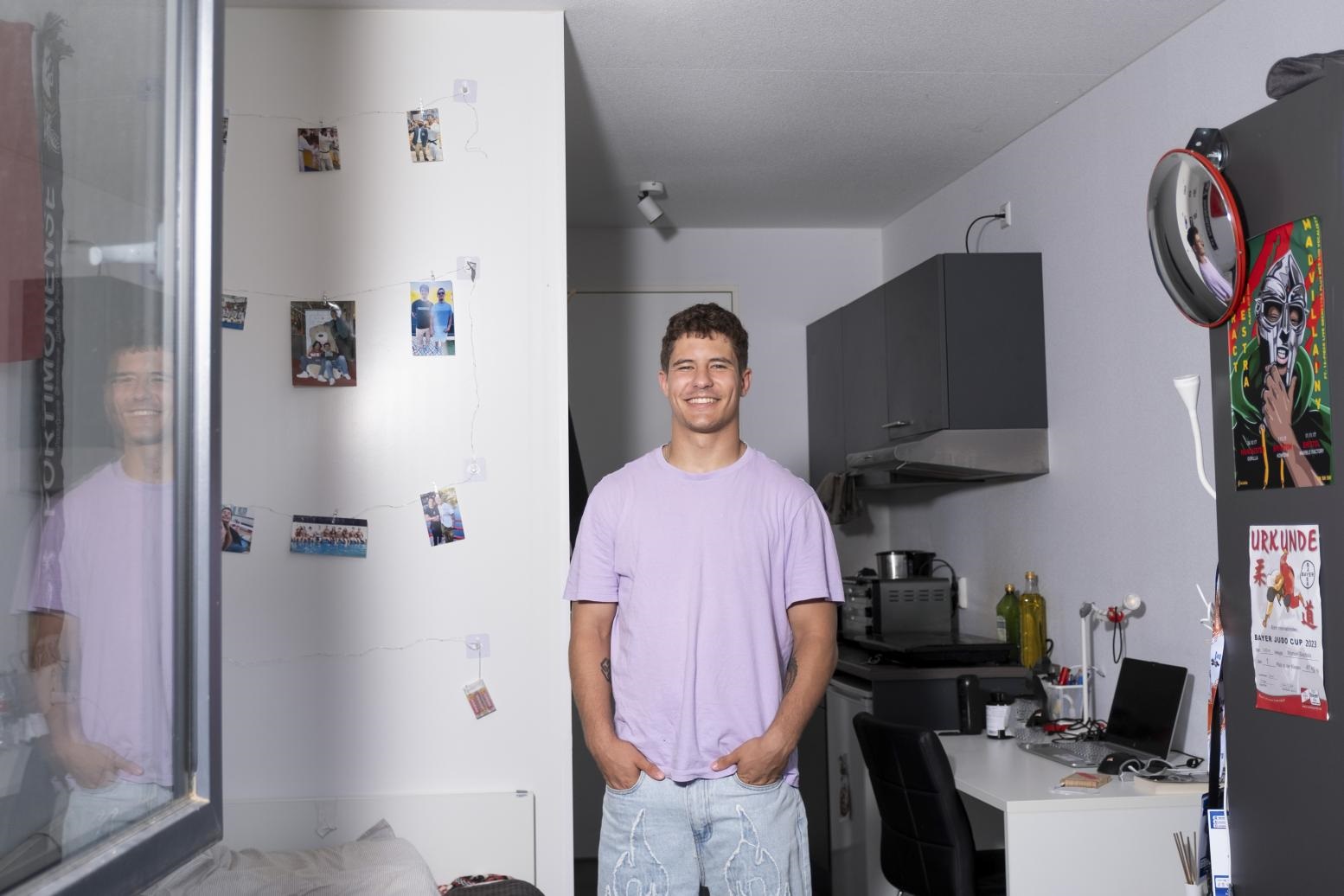There must, no, there will be a change in science
How scientists are rewarded and recognised for their many responsibilities must change; this is the conclusion of fourteen Dutch universities and related organisations (VSNU, NWO, NFU, and ZonMw ). In the words of Rik Van de Walle, rector of Ghent University: “The old-fashioned model is quite a stupid model.” He was one of the inspiring speakers at the conference, on 15 November in Rotterdam, on different approaches to recognising and appreciating scientists. UM rector Rianne Letschert is one of the initiators of the ‘position paper’ containing the basic principles for a ‘new model’, which minister Van Engelshoven accepted at the end of the conference. Letschert: “As I keep hearing: It’s about time!”
A scientist can be successful in many areas, but not all qualities are equally appreciated. Research performance has determined the career path of scientists for many years, and this dominance is becoming increasingly problematic. The success of a modern knowledge institution is dependent on education and impact, as is patient care for the UMCs. The development of Open Access and Open Science, which also place different demands on modern scientists, are also vital. And there is growing attention to the fact that science is always a team achievement: team science.
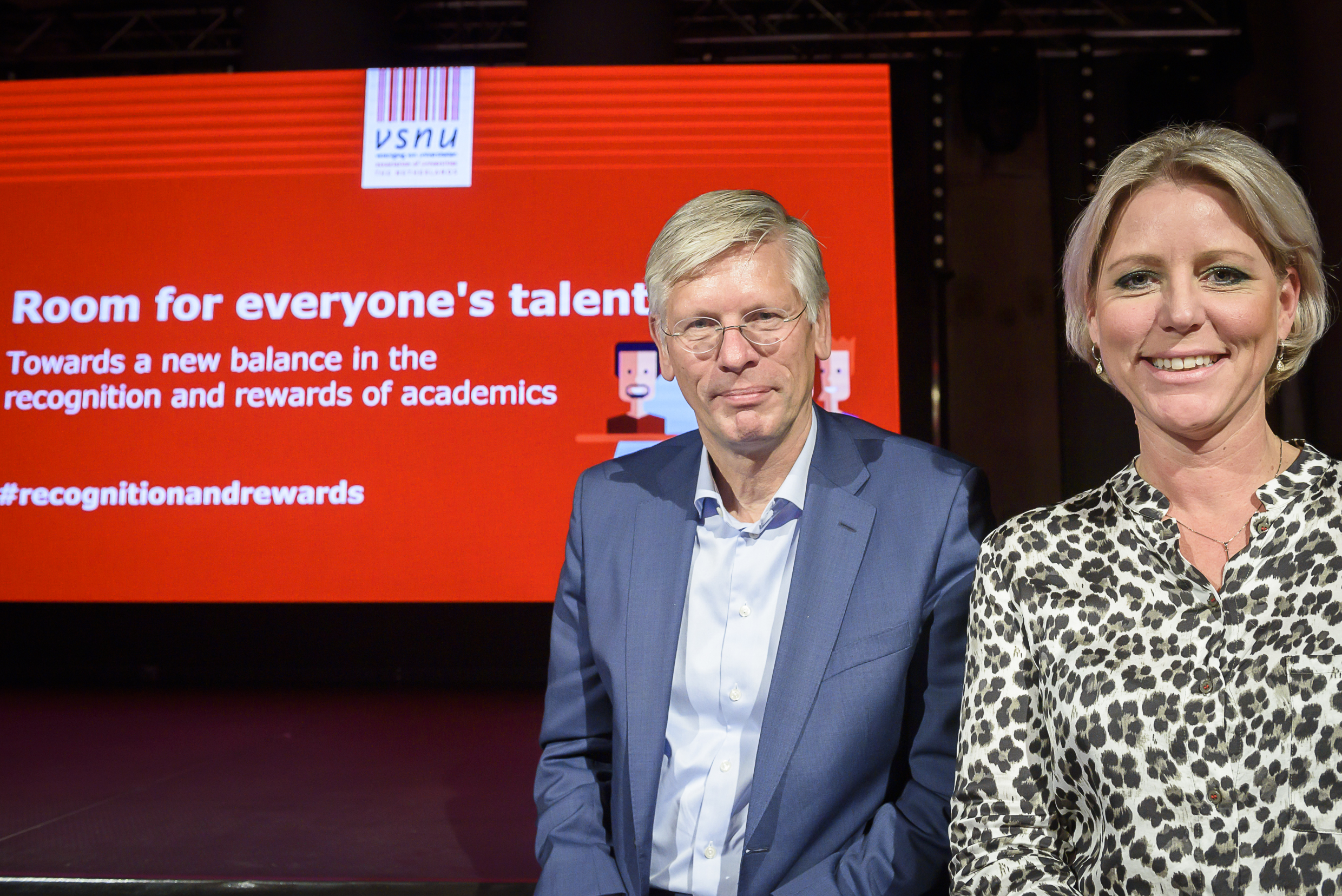
The rectors Frank Baaijens (TU Eindhoven) and Rianne Letschert (UM); the 'patronets' of the position paper ‘Room for everyone's talent - towards a new balance in the recognition and rewards of academics'.
Conference for 140 participants
These and many other aspects of the transition process that science faces, especially in the Netherlands, were central to discussions at the Rotterdam Maassilo on 15 November. The conference, organised by the Association of Universities in the Netherlands (VSNU) and the European University Association (EUA), convened some 140 scientists and other stakeholders. A small delegation attended from Maastricht, including Veerle Melotte, associate professor in Pathology. She recently won the Klokhuis Science Prize for her research into intestinal cancer and the NDRG4 gene in the ‘enteric brain’ in our intestines, which she made understandable for children aged 9 to 12.
Anyway... how do you measure all those new skills?
“I am here today because it fascinates me as a ‘young scientist’, and I represent the UM institute GROW. The principles of the position paper are very encouraging, and I support a change of direction. However, I do wonder how you can assess all those new facets of academic work. For example, how do you measure good leadership? I do not support the current system, but it is straightforward when it comes to assessing research quality.” (text continues below picture)
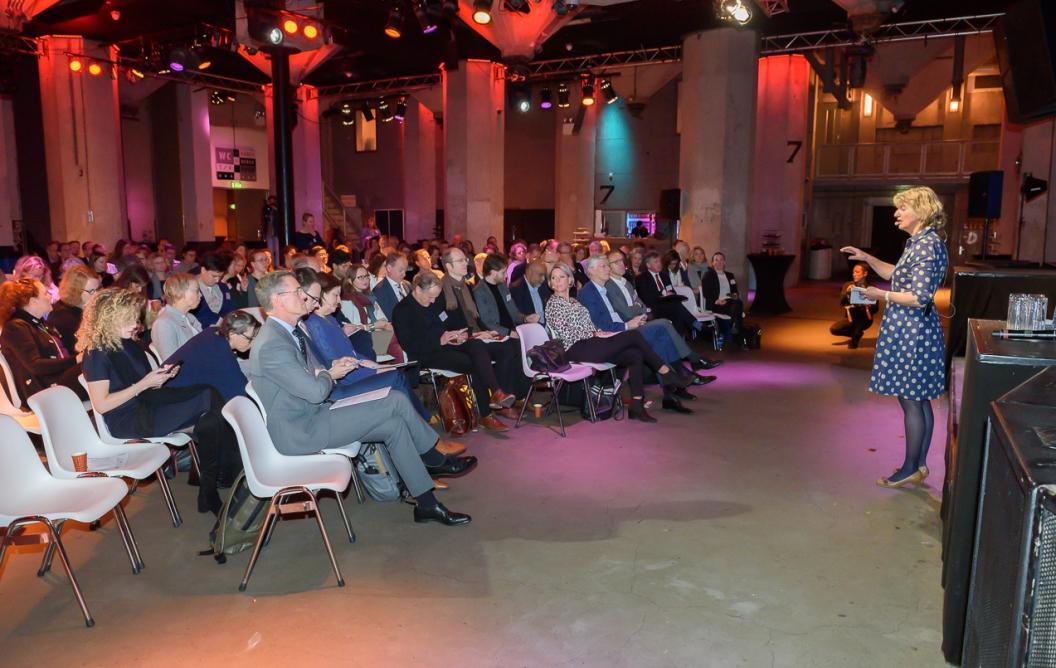
the conference venue: Maassilo, Rotterdam
Photo: Rene de Gilde, VSNU
Change is absolutely necessary
Kim Kuypers is an associate professor in Psychopharmacology and, as a member of the University Council, is well-informed on the subject. “A lot is going to change, and today I should like to receive first-hand information on this”, she explains of her attendance. “On paper, it seems like a big change, and that’s necessary because there is a lot of frustration in the workplace about making a career in science. The model that rector Van de Walle presented this morning was very inspiring.”
The Ghent Model as a source of inspiration
Rik Van de Walle from Ghent University shared ‘The Ghent Model’ with the room, which was introduced last year. This trust-based model depends on two components: academic freedom and responsibility. Every academic is assessed every five years on all their activities. No metric criteria need to be met to qualify for a career step, but there is a portfolio of activities and your role in a team context also counts. “If you perform well, you will be promoted, even if someone else performs even better.”
Some questions remained
“Can you afford that?” the audience asked. “Yes, we have set a budget for the next five years based on the consequence that everyone is promoted, thus the worst financial scenario. It’s a choice!”, was the reply. “How do you rate someone’s educational performance?” Van de Walle: “You have to talk to the study programmes’ students and their education committees. What is the impact of a particular teacher on innovation, for example?” “Will the effect of these measures indeed reduce the stress level among academics, as you are aiming for?” Van de Walle: “I expect this to be the case, but we can’t measure the effect yet.”
Tips were also given
Rik Van de Walle also gave some suggestions for successfully implementing such a model. “Communication is essential for change management. Such changes require academic leadership and ambassadors at all levels.” This is the greatest added value of the conference, according to UM rector Rianne Letschert who is the position paper’s driving force together with her colleague Frank Baaijens from the TUE. “On days like these, you are mainly preaching to the converted; not the major criticasters. But that’s not a problem, because those ‘believers’ are inspired to bring it up with their colleagues and managers in the workplace. Knowing the sector, I believe that mobilising the masses achieves the most.” (text continues below picture)
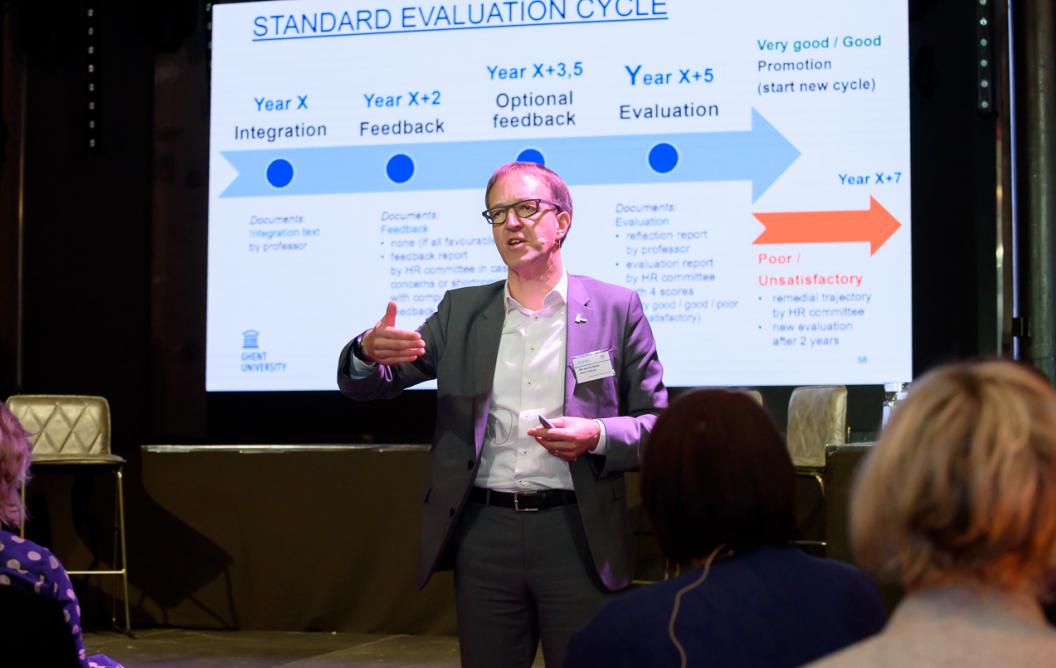
Rector Magnificus Rik Van de Walle about 'The Ghent Model'
Photo: Rene de Gilde, VSNU
And what about our position abroad?
Letschert hopes that as many UM employees as possible will read the position paper and actively work with it. “Talk to your colleagues about it. And if your department chair eventually doesn’t see anything in it, go to your dean or come to me.” She is confident the recognition and appreciation of scientists will change drastically in the coming years. “People sometimes ask: What does this mean for our competitive position abroad? But I do not foresee any negative effects, because we do not prohibit you from excelling in research; that you publish in Science of Nature. We only want those who excel in education, or patient care, for example, to have the peace of mind that it is appreciated and that promotion opportunities are available.”
The minister will also do her best to achieve this
Minister of Education, Culture and Science Ingrid van Engelshoven formally received the position paper at the end of the official programme. She drew a parallel with the first steps on the moon, which, thanks to the collaboration of hundreds of scientists, 600 million people witnessed fifty years ago. “This new direction inspires new generations to pursue scientific careers, and they must continue to do so. The transition to another system must take place; a system in which open science is the standard, diversity is the norm, and the emphasis is on collaboration. As President Kennedy said in 1962: ‘We choose to go to the moon, not because it is easy, but because it is hard[JC1] ’, I feel the same atmosphere here today, and I shall do everything I can to make this position paper a reality.”
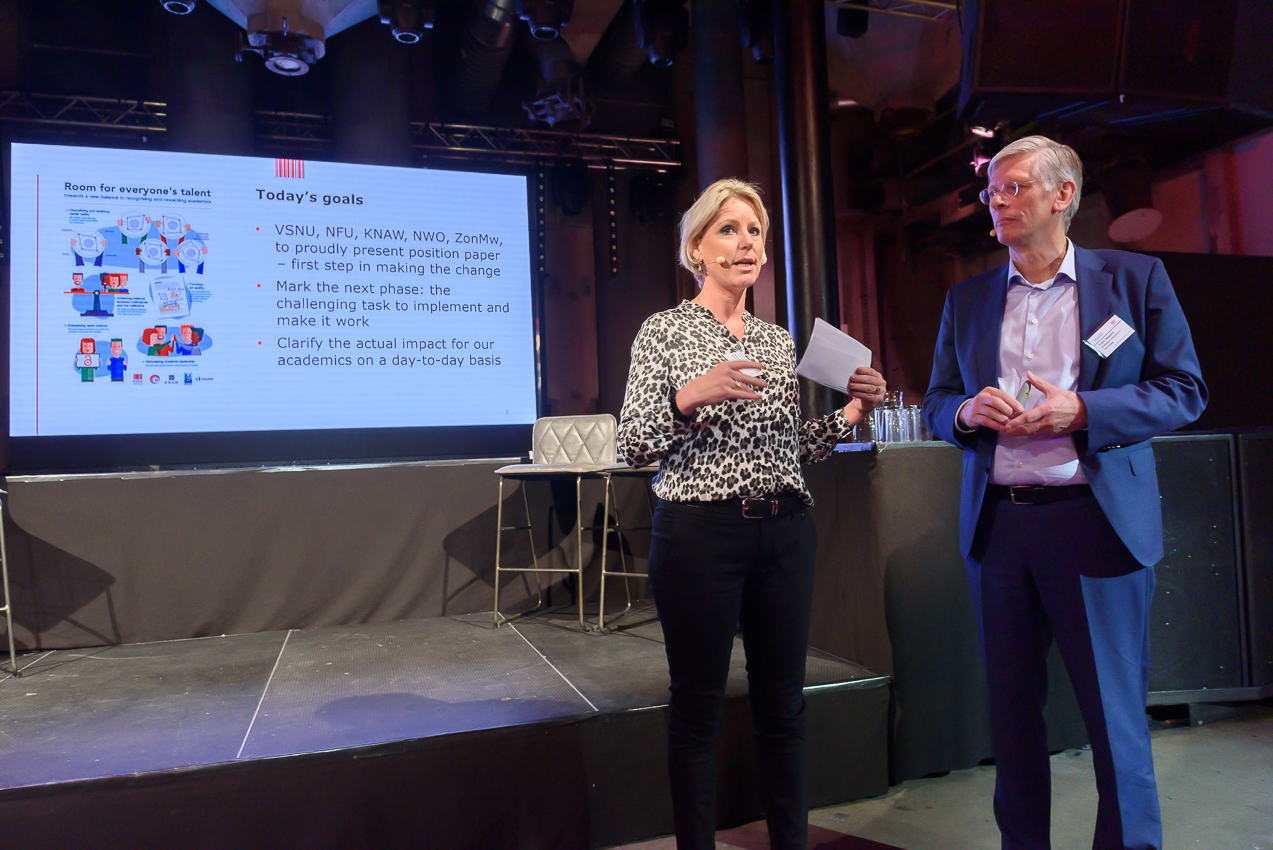
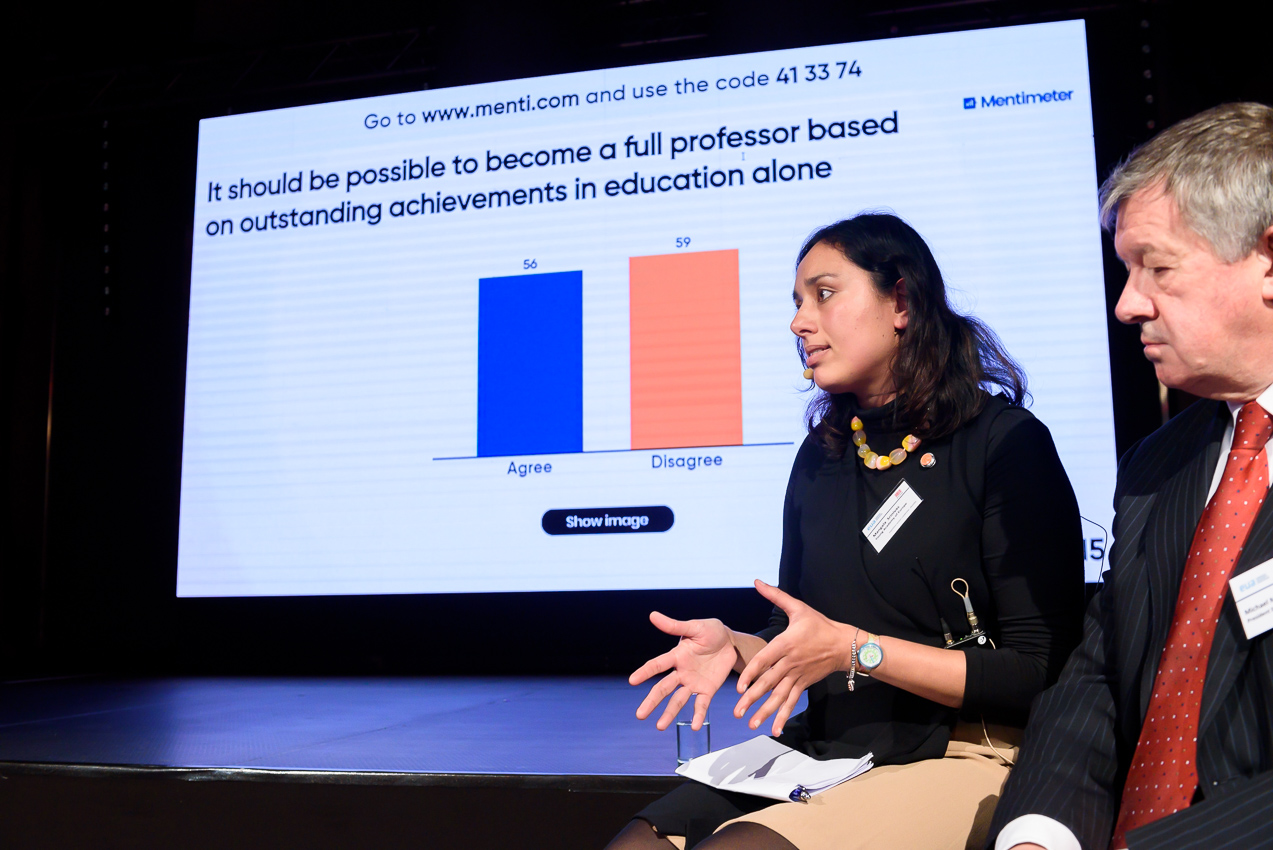
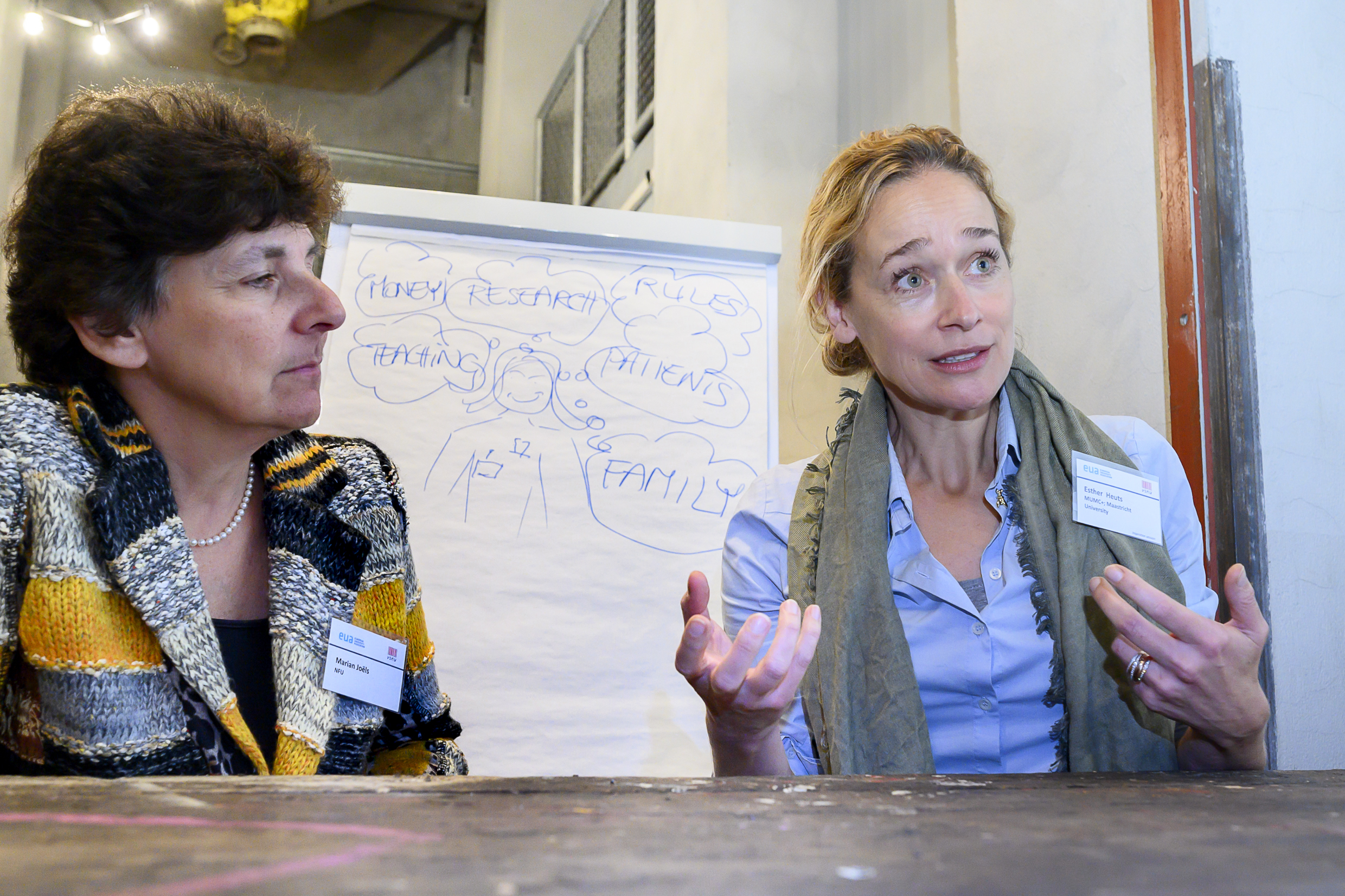
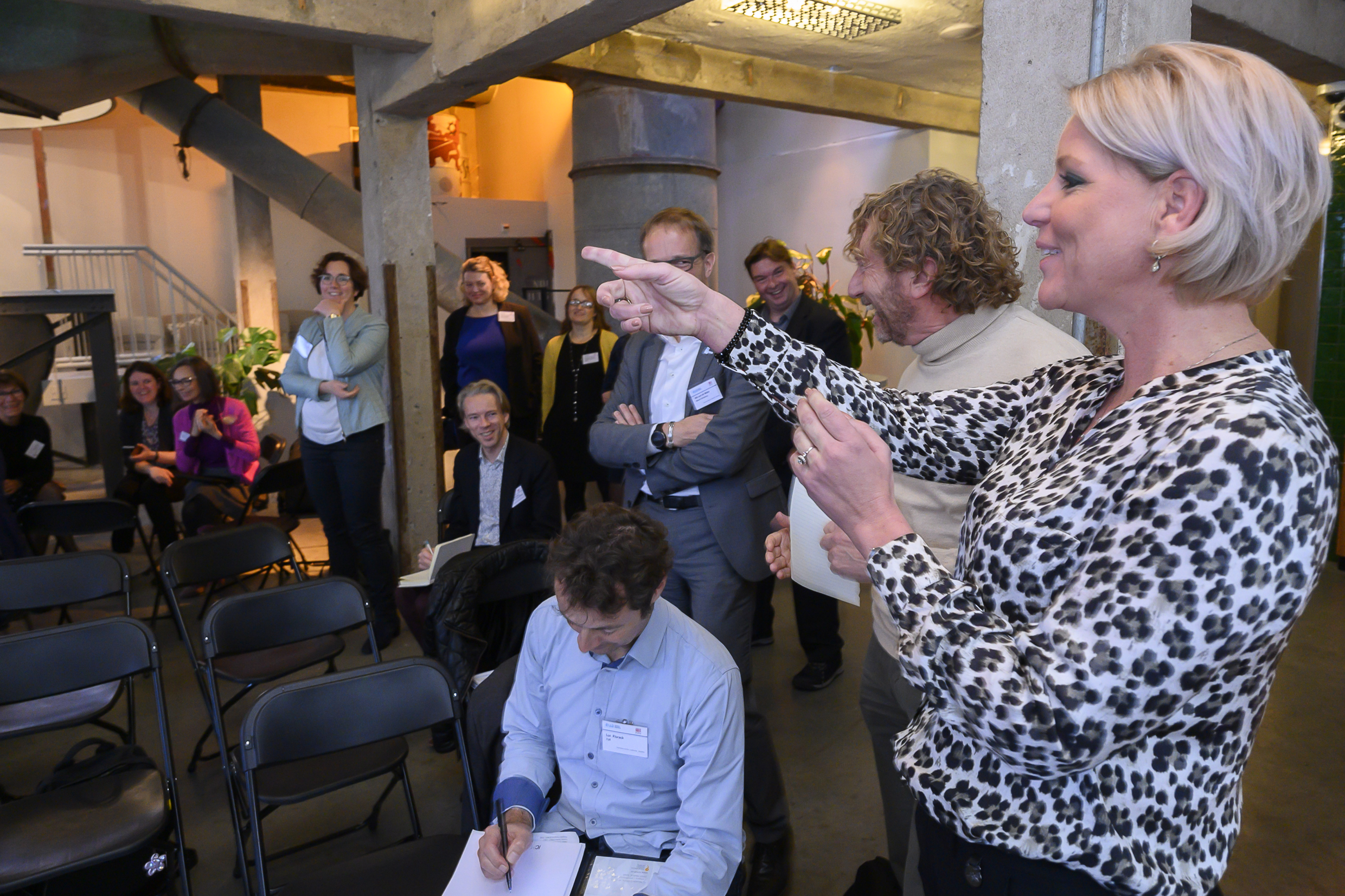
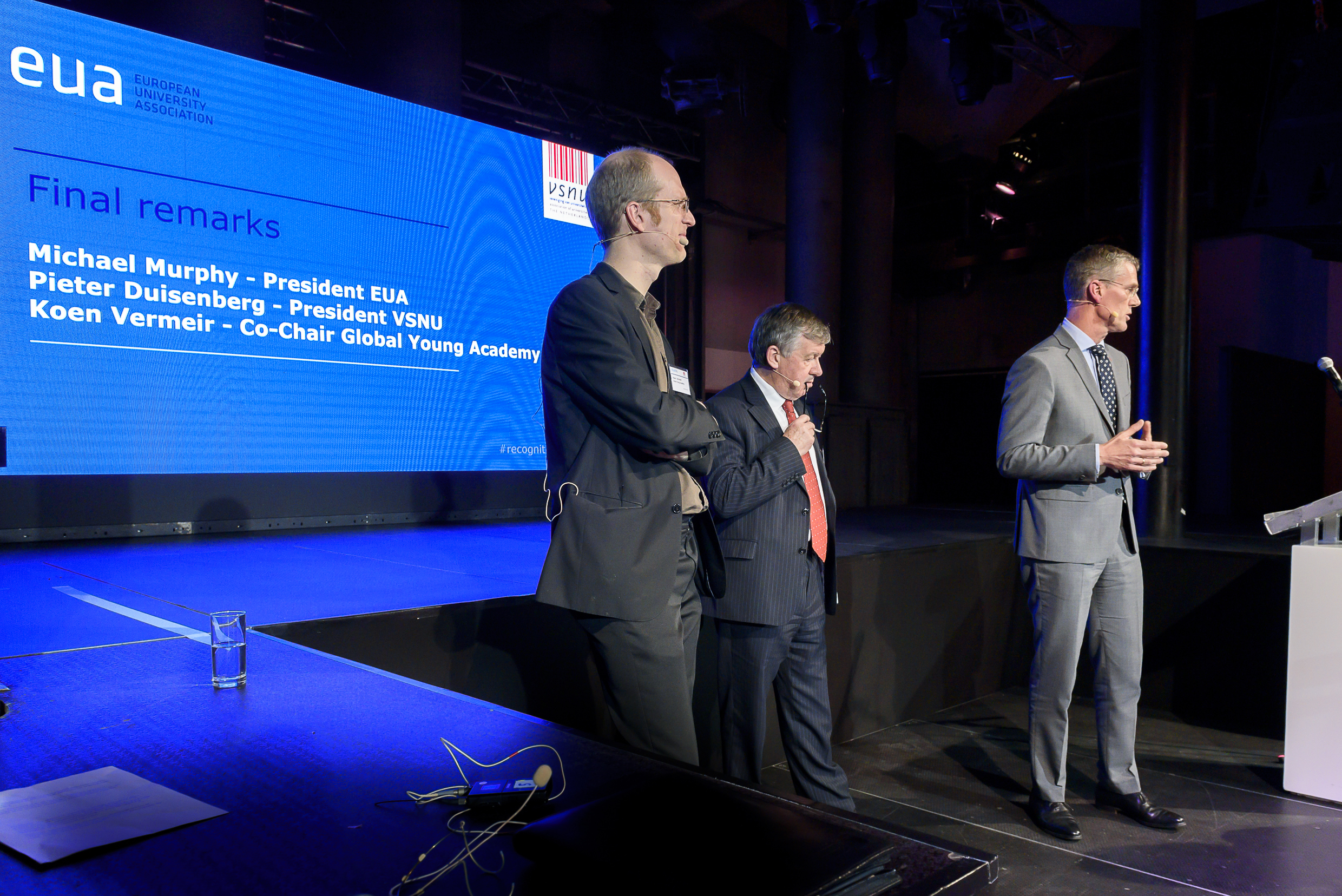
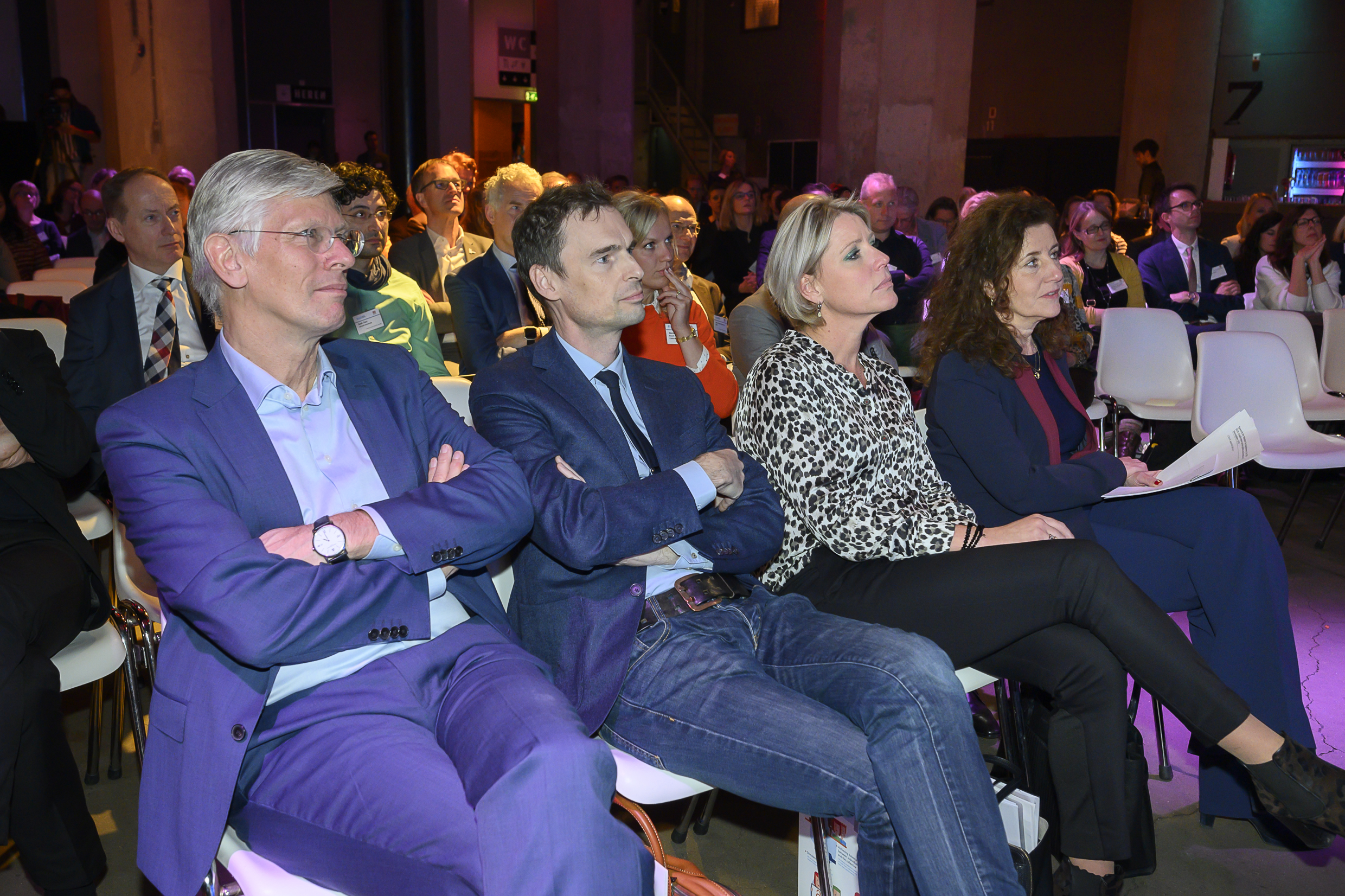
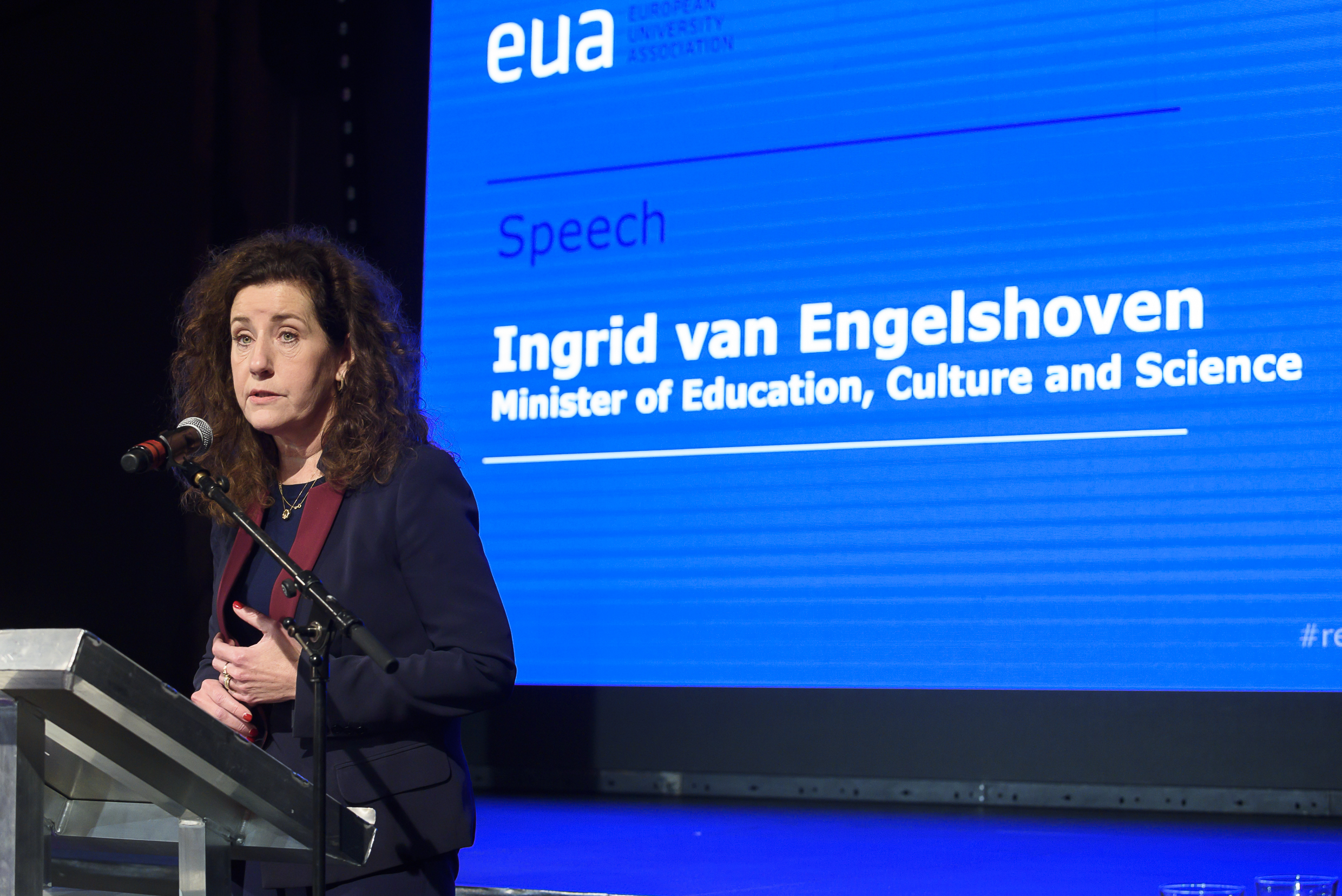
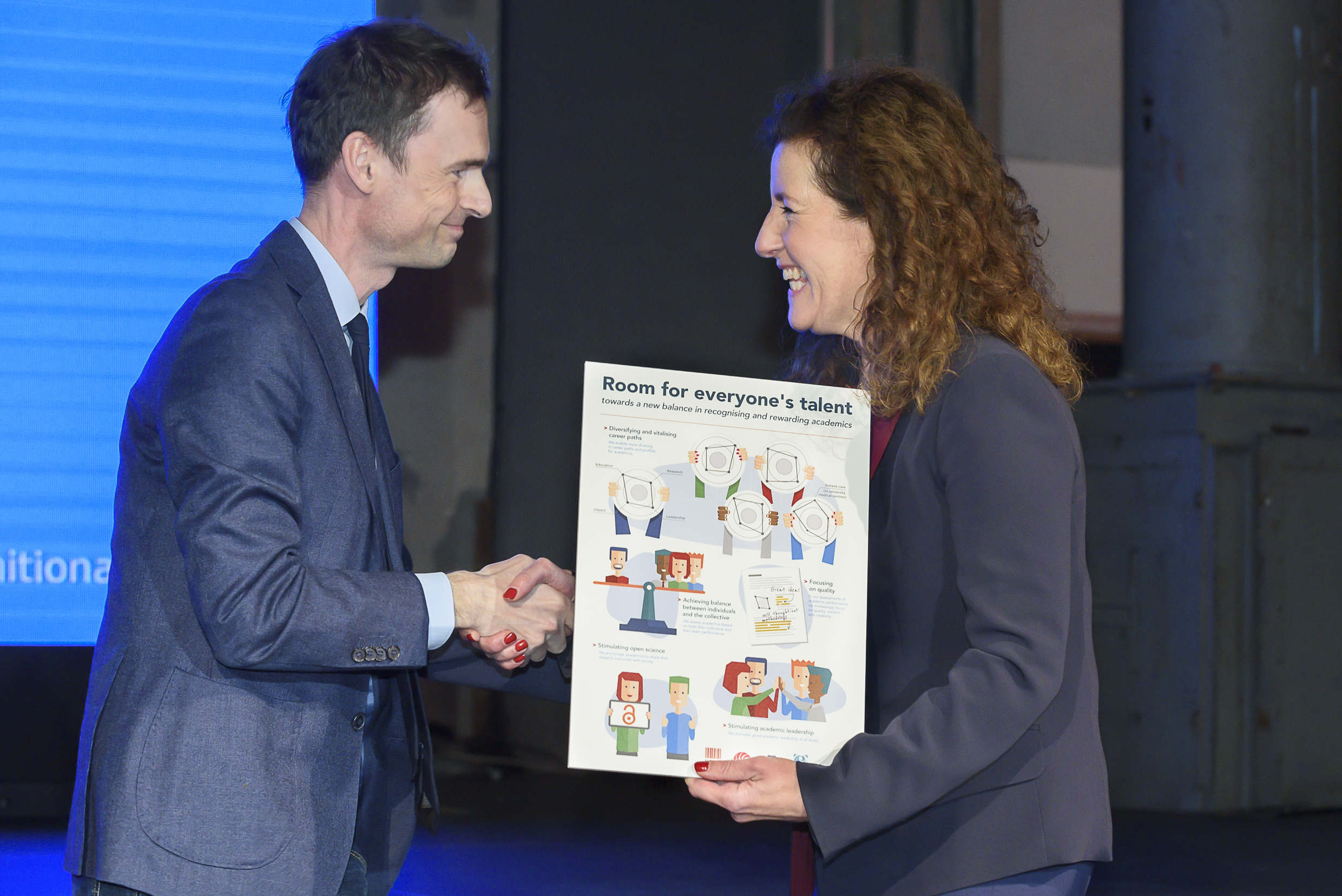
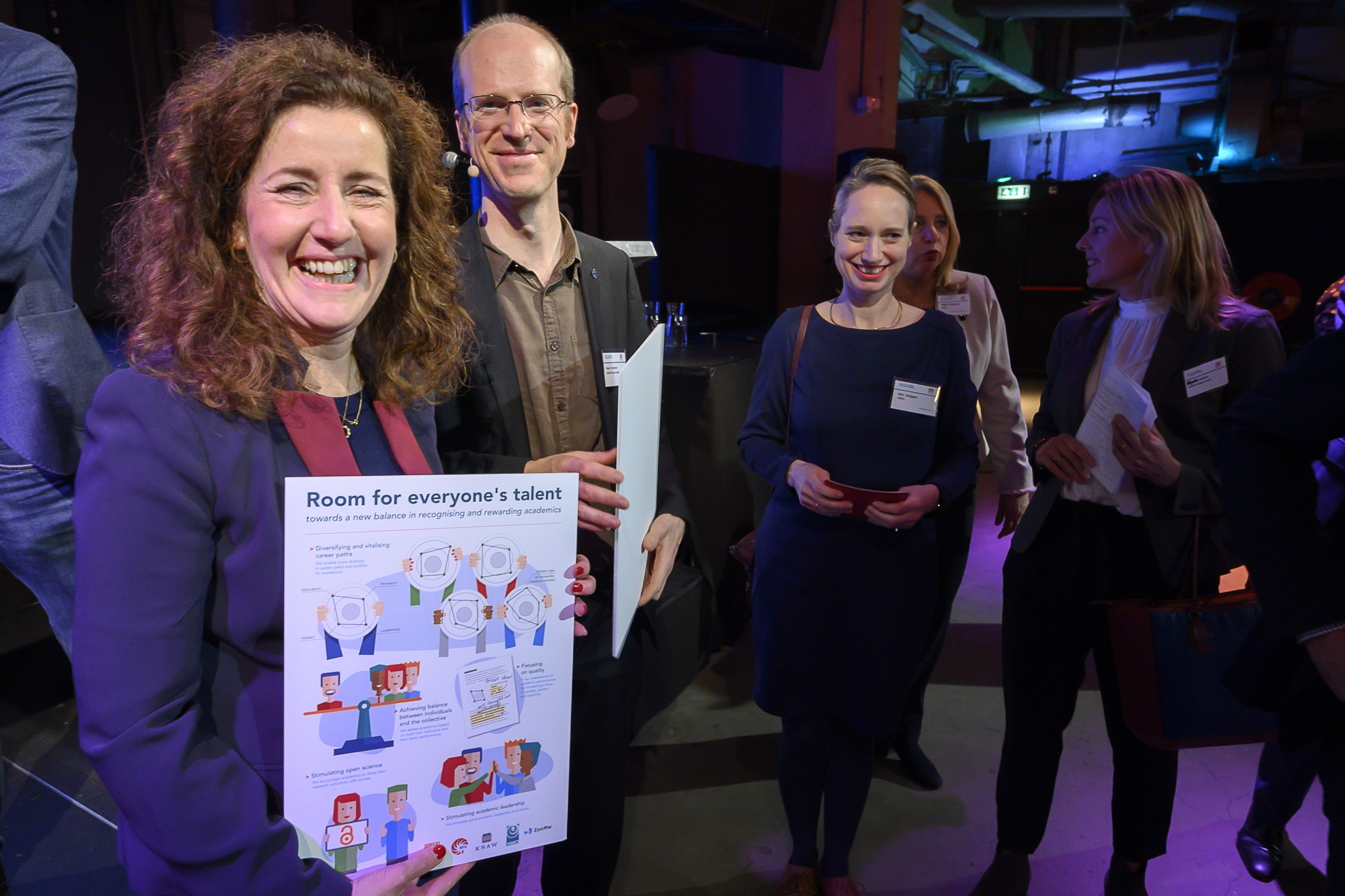
Rianne Letschert and her colleague Rector Magnificus from TU Eindhoven, Frank Baaijens, give an opening presentation. Photo's: Rene de Gilde, VSNU
Via Mentimeter the opinions of all participants were gathered on a number of questions. Left: Mangala Srinivas (President Young Academy of Europe), right: Michael Murphy (President EUA).
MUMC+ surgeon, researcher, teacher, mother and more, Esther Heuts (right) participated in the breakout session on societal impact.
Rianne Letschert in the breakout session about leadership in academia.
'Final remarks' by Michael Murphy (President EUA), Pieter Duisenberg (President VSNU) and Koen Vermeir (Co-Chair Global Young Academy).
At the end of the day minister Ingrid van Engelshoven joined the conference.
The minister was thankfull and full of praise about the position paper.
Jeroen Geurts (President ZonMw) offers the position paper to the minister.
The academy now awaits the nobel task, supported by the minister, to make the position paper a reality.
There was a livestream of the plenairy part of the conference, which you can watch online.
VSNU issued a press release on 13 November 2019 about the position paper.
Also read
-
The area on the Sorbonnelaan in the Maastricht neighbourhood of Randwyck looked somewhat bare and remote about two years ago. This was mainly due to the modular and temporary appearance of the student houses that were quickly built there. Meanwhile, the area is increasingly taking on the character...
-
Billions of dollars in foreign aid could be spent more effectively if international poverty statistics weren’t so inaccurate. Says Dr Michail Moatsos, Assistant Professor at Maastricht University School of Business and Economics.
